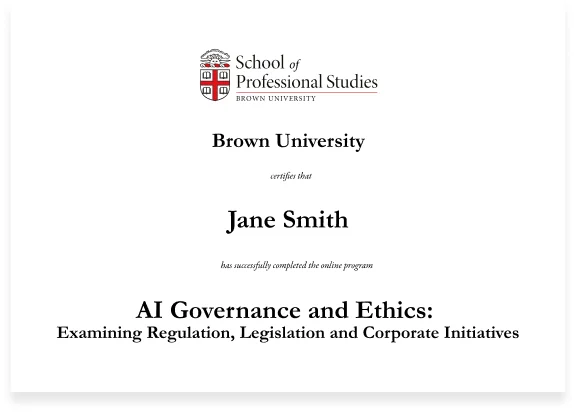
AI Governance and Ethics:
Examining Regulation, Legislation and Corporate Initiatives
Why Enroll in This Course?
AI could add a staggering $25.6 trillion to the world’s economy. (McKinsey, 2023)
AI could partially automate two-thirds of jobs. But many of these jobs will be complemented by AI, not substituted by it. (Goldman Sachs, 2023)
In 2023, the global AI market size was close to $208 billion. By 2030, it is expected to reach nearly $2 trillion. (Statista, 2023)
Over one-third of organizations already use security tools to mitigate the risks of generative AI. (Gartner, 2023)
Fewer than 20% of executives believe their applied AI ethics meet their stated values. (IBM, 2022)
Learning Journey
The overall AI Governance and Ethics course learning outcomes and structure have been curated to meet the call of leadership in emerging tech governance and provide vital information about how this technology is created and applied.
Key Takeaways
Define AI ethics and the core principles of AI and ML development
Explain the significance of ethical issues in AI, such as bias, fairness and transparency
Understand the current AI regulation and legislation landscape
Identify the role of governments and international organizations in regulating AI
Discuss the challenges and opportunities in regulating AI
Learning Experience
This two-week intensive course is designed to accelerate your learning and mastery of key concepts through hands-on experience. and real-time collaboration.





Faculty

Director of the Center for Technological Responsibility, Reimagination and Redesign (CNTR) with the Data Science Institute at Brown University, Former Assistant Director for S...
Guest Speaker

Founder and CEO of HiOperator

Certificate of Completion
Earn a Brown University certificate of completion upon program completion that carries the Ivy League reputation of academic excellence. In addition, all participants who successfully complete the program will earn 1.5 Continuing Education Units (Brown University CEUs). Brown University CEUs are calculated based on the number of learning hours in each course.
The Brown Difference




Didn't find what you were looking for? Schedule a call with one of our Program Advisors or call us at +1 401 4987851.
Early Registrations Are Encouraged. Seats Fill Up Quickly!
TBD
